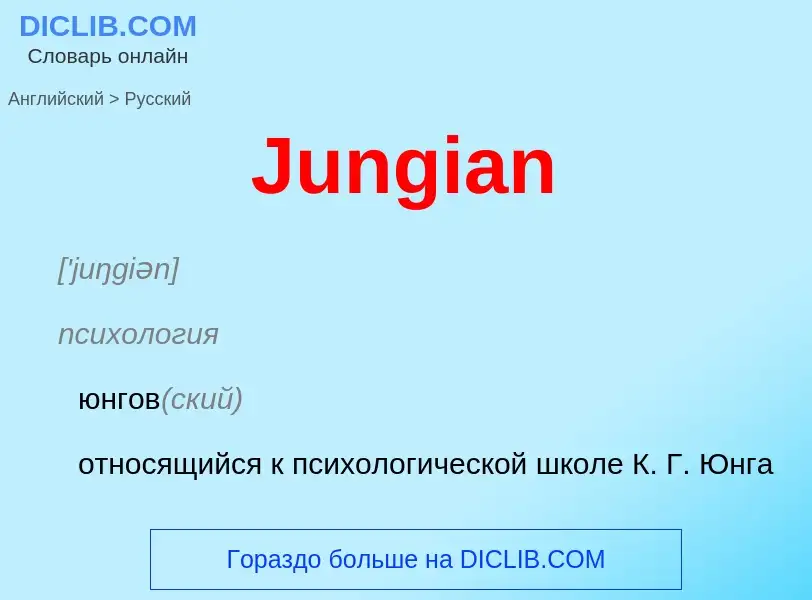Translation and analysis of words by ChatGPT artificial intelligence
On this page you can get a detailed analysis of a word or phrase, produced by the best artificial intelligence technology to date:
- how the word is used
- frequency of use
- it is used more often in oral or written speech
- word translation options
- usage examples (several phrases with translation)
- etymology
Jungian - translation to russian
['juŋgiən]
психология
юнгов(ский)
относящийся к психологической школе К. Г. Юнга
прилагательное
психология
юнгов(ский)
относящийся к психологической школе К. Г. Юнга
Definition
Wikipedia
Analytical psychology (German: Analytische Psychologie, sometimes translated as analytic psychology and referred to as Jungian analysis) is a term coined by Carl Jung, a Swiss psychiatrist, to describe research into his new "empirical science" of the psyche. It was designed to distinguish it from Freud's psychoanalytic theories as their seven-year collaboration on psychoanalysis was drawing to an end between 1912 and 1913. The evolution of his science is contained in his monumental opus, the Collected Works, written over sixty years of his lifetime.
The history of analytical psychology is intimately linked with the biography of Jung. At the start, it was known as the "Zurich school", whose chief figures were Eugen Bleuler, Franz Riklin, Alphonse Maeder and Jung, all centred in the Burghölzli hospital in Zurich. It was initially a theory concerning psychological complexes until Jung, upon breaking with Sigmund Freud, turned it into a generalised method of investigating archetypes and the unconscious, as well as into a specialised psychotherapy.
Analytical psychology, or "complex psychology", from the German: Komplexe Psychologie, is the foundation of many developments in the study and practice of Psychology as of other disciplines. Jung has many followers, and some of them are members of national societies around the world. They collaborate professionally on an international level through the International Association of Analytical Psychologists (IAAP) and the International Association for Jungian Studies (IAJS). Jung's propositions have given rise to a multidisciplinary literature in numerous languages.
Among widely used concepts specific to analytical psychology are anima and animus, archetypes, the collective unconscious, complexes, extraversion and introversion, individuation, the Self, the shadow and synchronicity. The Myers–Briggs Type Indicator (MBTI) is based on another of Jung's theories on psychological types. A lesser known idea was Jung's notion of the Psychoid to denote a hypothesised immanent plane beyond consciousness, distinct from the collective unconscious, and a potential locus of synchronicity.
The approximately "three schools" of post-Jungian analytical psychology that are current, the classical, archetypal and developmental, can be said to correspond to the developing yet overlapping aspects of Jung's lifelong explorations, even if he expressly did not want to start a school of "Jungians".(pp. 50–53) Hence as Jung proceeded from a clinical practice which was mainly traditionally science-based and steeped in rationalist philosophy, anthropology and ethnography, his enquiring mind simultaneously took him into more esoteric spheres such as alchemy, astrology, gnosticism, metaphysics, myth and the paranormal, without ever abandoning his allegiance to science as his long-lasting collaboration with Wolfgang Pauli attests. His wide-ranging progression suggests to some commentators that, over time, his analytical psychotherapy, informed by his intuition and teleological investigations, became more of an "art".
The findings of Jungian analysis and the application of analytical psychology to contemporary preoccupations such as social and family relationships, dreams and nightmares, work–life balance, architecture and urban planning, politics and economics, conflict and warfare, and climate change are illustrated in several publications and films.


![rose chafer]], the type of beetle Jung caught in his hand, as he heard a patient's dream containing a golden scarab rose chafer]], the type of beetle Jung caught in his hand, as he heard a patient's dream containing a golden scarab](https://commons.wikimedia.org/wiki/Special:FilePath/Cetonia-aurata.jpg?width=200)

